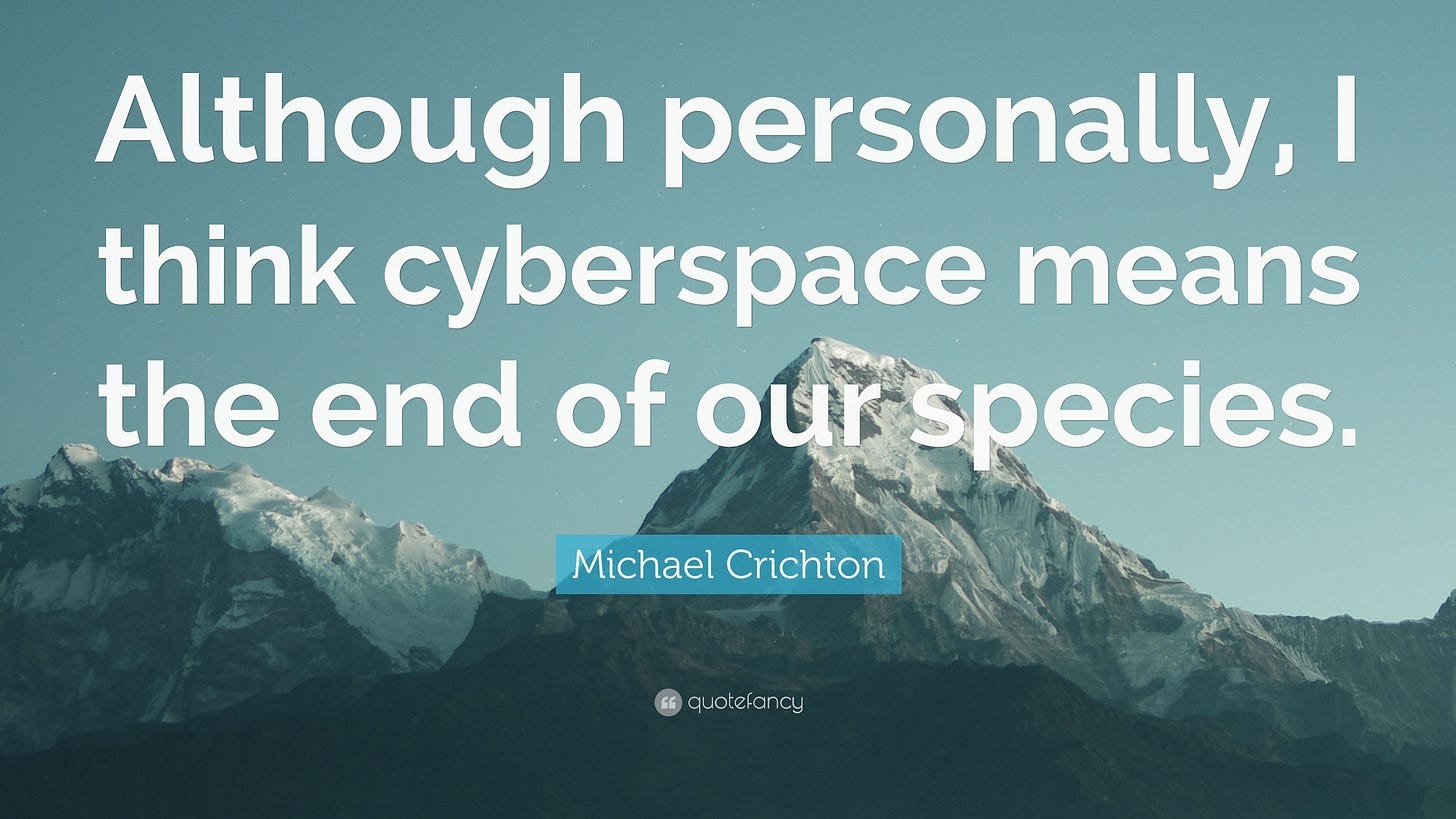This article summarizes what innovation is not, what real innovation looks or should look like, and why knowing the limits of today's (mainly) digital innovation is relevant for everyone, according to my long-time slogan "your rights and the quality of your life depend every year more on how software is used AROUND you". Initially, it should have been the first half of an article titled "The innovation scam, and what it means for parents", but I realized that the first part stands since it stands on its own, and is much more general, it was better to publish it separately.
"Disruption" is not innovation
Disruption became popular in the late 1990s, thanks to a theory later described as "founded on panic, anxiety, and shaky evidence". Whatever positive qualities the original idea has, these days disruption is too often just the mask over "let's make a quick buck with some tech fad".
One obvious reason for this is that contemporary "markets" have been degraded to gambling halls, whose only purpose is to make quick money with as little risk as possible, collateral damage be damned. Under such policies, even the most well-intentioned funders of "digital disruptors" can do little more than raise and cull hunter-gatherers of data, attention, time... from human emotions, whole cities and everything in between, contributing to "economic suicide" and killing many innovators. A rat race that already ten years ago was making "the young barely talk to the old (and vice versa)" inside tech companies, letting profit and PR market as "innovation mere tweaks of existing products.
High-tech but really STUPID products and services are not innovation
No inventory of such things could ever be complete because, just like the famous fools that Barnum never spoke about, there is one born every minute (and that's hardly a coincidence, if you ask me). The two short lists that follow, however, should be enough to recognize most "innovation" that only makes our lives stupidly fragile. Some things are actual products or services, usually called "smart" to hide that they are just the opposite, that is overpriced, uselessly connected toys:
locks that any screwdriver could open
fruit squeezers that worked worst than your hands
bird houses that just put e-waste around birds that nest
polluting strollers that prey on parental anxiety
all the "Smart Home" devices incompatible by design, with "ridiculous or damaging support"
cars called "smart" because they could never be yours
every "cool" app designed to be an addictive distraction without solving any real human need
Then there are high level superstitions, er, I meant "trends", like:
fintech like Libra, whose "epic" mission turned out to be just a childish attempt to solve "US retail banking being a few decades behind the rest of the world"
encouraging ignorant nutcases proud of never reading books to polverize billions of dollars before stopping them
believing that online countries could ever work, or that declarations of "Independence of Cyberspace" could be ever taken seriously
escaping to metaverses that just reboot reactionary and authorian attitudesm
falling for any other project whose purpose is to make sure you never actually meet or talk with other humans
So, where did innovation go?
Not in the digital sphere, probably, if even the last Mobile World Congress was "incredibly productive while at the same time largely unexciting". Trouble is, even the other parts of our lives don't look sizzling with innovation. In many areas real progress, material or cultural, has stalled. Cars, for example, are just getting too big to park them, while songs are shrinking. In general, which may be the most worrying thing, "everything looks the same", from furniture to cars, restaurant menus, clothes and websites.
This is what Michael Crichton said would mean "the end of our species", not innovation. Mind you, it may still turn to actual innovation if used and managed properly, but that is a topic for future articles.
Religion rebooted is not innovation
It's desperation, more like.
As time passes, it becomes harder and harder to dismiss the fact that a non negligible part of the void created by the general decline in religiosity among beings who keep seeking and needing perfection has been occupied by bigot technological fundamentalism.
Twenty-five years ago there were prophets preaching that "technology must be allowed to operate without hindrances to generate the wonders of which it is capable."
Today, little has changed. The messianic founders of cities and cults of yore have moved to tech, "obscuring some of the fundamental factors in innovation", as none else than MIT puts it, and stopping at acritical recompilations of John's Gospel remains exactly what keeps many people going: "and you will just accept (ANY!) TECH, and TECH will set you free".
Or, as the Convivial Society says, "Enlightenment did not vanquish Religion: it empowered the religion of technology".
In 2023, the main if not only news in this field is its regrouping around "Artificial Intelligence" (AI), even if many (NOT all!) of its more popular uses would save almost nobody from existing annoyances like inequality, populism, xenophobia, racism, sexism, attacks to democracy in general and environmental crises.
On this front, I personally find intriguing the hypothesis that such a "regrouping" may just be out of desperation that "nothing else looks even remotely [capable]" to keep Big Tech the fairest of them all. The hypothesis, that is, that AI is the last stand to save digital tech from growing up, to be just another stable, mature, unglamorous industry like many others, with the same average profitability or job (in)security:
REAL innovation is beneficial and REALLY creative
We gaslighted ourselves to recognize and demand as "innovation" almost exclusively digital stuff that makes our inner toddler play or go "WOW"!
Above all, much technological development of the last decades, especially digital, has made people passive. Or, if you prefer, is stuff that only a very tiny fraction of the actual human beings alive today can use actively. Yes, this is true for every tech, but it's particularly relevant for anything done in software, because software it's just like alphabets: once it's arrived, it's not really containable anymore.
The flood of software-promoted passivity has contributed a lot to the decades-long decrease of REAL creativity and to the already mentioned fact that "everything looks the same". If all one's brain gets is passive consumption of software, or software-mediated reality and interactions, it has no time or reasons left to think, and create. At the same time active imitation, which has been for ages the foundation of creativity, has been banished to prioritize invention for the sake of invention. Because disruption, of course.
Real innovation, instead, should (not always!) go hand in hand with diversity and curiosity for the unknown.
Real innovation seldom starts from tech
There is a lot of stuff that the world needs before yet another generation of smartphones designed for obsolescence, falsely smart cars or addictive social media.
Smart, open standards for packaging and shipping (that's another future article)
Toilets that really work, instead of toilets that spy you
What our time needs is not "startup" mythologies that make otherwise bright people waste their best energies, specifically to sell the results to big companies that buy it exactly to kill innovative competition. It is real entrepreneurship for real problems, that yelds social, digitally-powered but not strictly technological innovation, like in the two examples above.
This is not Luddism! If anything, it is a call for real innovation to solve real problems with appropriate technology.
Let's accept it: "social disruption came first" and so far technology has more accelerated than mitigated it. Had you ever realized, for example, that we predicted cell phones, but not women in the workplace, and then continued to dump all the load on them.
The truth is that any moron can pretend to "innovate" by just consuming more money or resources. Real genius, in this age at least, is making more with less, to solve problems instead of inventing needs. On the same note, why are repair and maintenance snobbed in all fields, from plumbing to software, when they have come to look more rebellious, that is more really innovative, than anything out of the likes of CES?









of course, just after publishing, I found one more proof of my theses:
"All of the products we seem to be creating these days are all about increasing the marginal ease or quality of living**. Except for a few sparse examples, we’ve stopped pushing the boundaries of human ingenuity."
Said in 2014 by George P. Sibble here: https://startupdreams.substack.com/p/first-world-problems